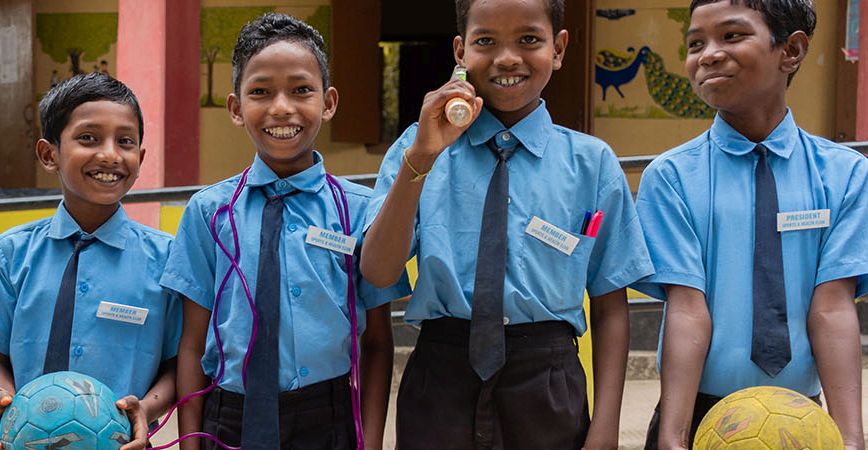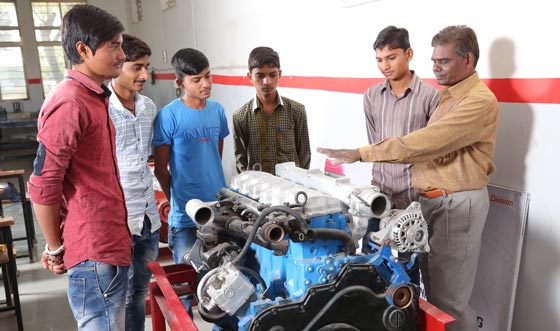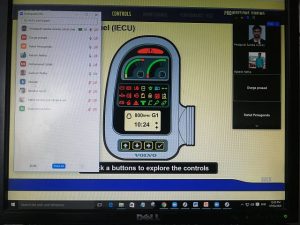Koura donates 10,000 inhalers to Maharashtra govt
Koura, part of Orbia Advance Corporation, has announced a successful donation delivery of 10,000 medical-grade inhalers to the Government of Maharashtra. The delivery of these donated inhalers aims to help authorities maintain supplies at a time when critical need and demand has increased globally to mitigate the symptoms of COVID-19.
Patients with or without pre-existing respiratory conditions who have contracted the virus are becoming reliant on pMDIs (pressurised meter dose inhalers), as a vital method for relieving breathing difficulties.
Koura activities are essential in the current fight against the COVID-19 virus. 80% of the world’s medical-grade inhalers used daily by 100 million people for asthma and Chronic Obstructive Pulmonary Disease (COPD) are powered by the propellant gas manufactured by Koura. As part of a purpose-driven community of businesses, Koura is helping to advance life around the world and help tackle pressing global challenges and this donation is part of a wider effort by Orbia in seeking to contribute to the efforts being made by authorities to fight the coronavirus (COVID-19) pandemic through providing essential support and solutions.
Disclaimer: This media release is auto-generated. The CSR Journal is not responsible for the content
PokerBaazi.com Organizes First of its Kind Live Session on Mental Health
The world is experiencing elevated stress and anxiety levels owing to the ongoing Corona pandemic. Amidst the given state of affairs, PokerBaazi.com, India’s leading online gaming platform has announced a Facebook live session in association with Poker Boot Camp India on the subject “MENTAL HEALTH AT THE FELTS” scheduled for 10th July 2020 at 5pm. The 60 minutes session will be hosted by Abhishek Goindi, Poker Coach & Co-Founder, PBCI, along with Dr Nisha Khanna, Celebrity Psychologist, Certified EQ Coach & Baazi Care Expert. The poker coach and psychologist will together discuss the psychology of poker.
The skill game involves a lot of mental stimulation and often requires people to have good control over their mind. This session organized by PokerBaazi.com, the brand that has always focused on responsible gaming, will help people with ways of strengthening their mind thereby having greater control of situations.
Dr Nisha Khanna, Celebrity Psychologist, Certified EQ Coach & Baazi Care Expert, said “A mentally healthy person is better able to deal with real-life situations in a much more calm and controlled way. In the prevailing scenario, people are witnessing a sudden increase in their stress levels, therefore I personally feel that such platforms will help us to initiate the conversation on mental health and allow us to help many around us. Besides, gaming is also a great way to facilitate people to manage their mental state. It fulfils a person’s need for competence, autonomy and relatedness thereby instilling a sense of confidence and positivity.”
Navkiran Singh, Founder and CEO, PokerBaazi.com added, “Mental health has always been an extremely imperative subject to focus on, and given the way the global situation is unfolding, the subject occupied even more of a hot spot. In the wake of the current series of events, we really wanted to emphasize the relevance and application of mental strength in our daily lives. With this session being conducted by professionals, we are confident that we will be able to impart some understanding to the people around and assist them to have better control over their mind while playing poker or beyond the game.”
Abhishek Goindi, Co-Founder PBCI further stated, ”I believe in mind over matter! This initiative by PokerBaazi and Poker Boot Camp India is aimed at helping and guiding poker players across the country to deal with mental challenges that are never addressed but are a huge hindrance to one’s growth in this beautiful mind sport.’
Disclaimer: This media release is auto-generated. The CSR Journal is not responsible for the content
Forest Officer Improves Life of Forest Dwellers By Leading Transformation
Leadership in the right direction, assertion and tremendous empathy can pave way for transformation. This has been achieved by Anshu Pragyan Das, Deputy Conservator of Forests (DCF) Ecotourism.
Muduligadia, a small village in Nayagarh district of Odisha consisted of about 35 households. The residents of the village had for years engaged in gathering forest resources like honey and timber. They used firewood for cooking and drew water from the Mahanadi river.
Without proper awareness about the environment and hygiene, the villagers used to bathe and wash in the river, and use the same river water for drinking purposes. Open defecation was rampant, often leading to disease breakouts in the village.
With an intent to improve the lives of these households, Officer Das, erstwhile formal Divisional Forest Officer of Mahanadi Wildlife division and her team, lead the villagers to their journey of transformation. Now, since 2019, Muduligadia is the first village in Odisha to attain self-sustainability with zero-waste and 100% eco-friendly initiatives of livelihood. The re-modelling of the village into an eco-village was done exclusively by the community members under leadership and mentorship of Officer Das and team.
Road to Change
Muduligadia falls in the buffer zone of Satkosia Tiger Reserve. Since 2016, the small villages around the Satkosia Tiger Reserve had been integrated into a Community Managed Nature Tourism programme. As a part of this project, around 45 ecotourism destinations were developed in the forested area, which was exclusively managed by the local villagers. 80% of the amount generated from this is returned to the villagers in the form of profit, and 10% is utilised in the further development of villages. It was the utilisation of these funds that facilitated the transformation of the village.
The creation of the eco-village was life-altering for the villagers since they had to unlearn their traditional way of things and adopt sustainable alternatives. However, the villagers determined to make a change, adopted the new order actively.
The villagers were made to take up LPG gas which not only contributed to better health and improved standard of living but also brought down air pollution significantly. Through active awareness and education, the community was persuaded to set up toilets in their houses and turned their village Open Defecation Free in 2019. Some community toilets were also set up for further convenience. Water connectivity was been established in all the homes, thus negating their dependence and exploitation of the riverine water.
Previously, household garbage used to be thrown astray at the roadsides or even into the Mahanadi river, leading to abject pollution. Now, the villagers themselves have decided on a “No-Litter” policy and installed several common public dustbins along the village roads. Household garbage is deposited every day in these community dustbins from where recycling is also done. The villagers have also pledged to make their village 100% plastic-free.
The project has also pushed them towards organic farming. Earlier, agriculture was never of significant importance in Muduligadia, though some families occasionally cultivated seasonal vegetables and grains — resorting to conventional chemical farming for the lack of better understanding. Presently, the village practises organic farming using cow dung manure.
The project has also brought about some economic benefit to the villagers. The eco-village has attracted a lot of tourists to the village generating a revenue of more than Rs 1 crore in each of 2018-19 and 2019-20 financial years. This has upgraded household incomes of each of the families in Muduligadia with each household earning on an average Rs. 15,000 per month.
CSR News: IndiGoReach wins eNabling North East Development Award 2020
The CSR arm of air carrier IndiGo – IndiGoReach – has been awarded the 7th eNabling North East Development Award 2019-2020, for improving the livelihood of Tribal communities from Assam-Meghalaya border areas through the multiplication of spices.
The IndiGoReach women empowerment initiative (IndiGo Shakti) strives to increase income generation opportunities for 1,500 women farmers in 24 villages of Kamrup and Ri-bhoj districts. The award was declared in an online webinar attended by Govt functionaries, corporates, civil society groups, academicians, and other invited participants.
Raj Raghavan, Senior Vice President, IndiGo said, “This is a recognition for all the team members, who worked really hard to generate sustaining livelihood and income of groups and communities based on the region’s local resources, skills and capacities. Our endeavour through community outreach programmes is to help people to re-build livelihoods by working together for the nation. These initiatives reflect our relentless commitment to strengthening the micro-economy through trade and commerce within the northeastern states of India, while enabling the Government’s ‘Act East’ vision.”
The 7th edition of eNorth East Awards 2019 was organized by Digital Empowerment Foundation and North East Development Foundation. Some of the organizations like Assam State Rural Livelihood Mission, Government of Assam, CML-TATA TRUSTS, Star Cement and such, had also participated in livelihood and income generation category with IndiGo. The past winners of this award were Wipro, IBM, UNICEF, Government of Mizoram, National Rural Health Mission.
Disclaimer: This media release is auto-generated. The CSR Journal is not responsible for the content
ABA Corp expressed gratitude to UP police with donation of safety kits
Police personnel have truly gone way beyond in delivering their services during the Coronavirus pandemic, irrespective of day and night. In order to applaud their efforts, and appreciate their valuable contribution ABA Corp has donated a set of two sanitizing machines, 5 Litres of sanitizer, 250 masks and 10 shields to several police stations in Gautam Budh Nagar in Uttar Pradesh. The police authorities and representatives from ABA were present to carry out the distribution process smoothly.
COVID-19 cases are continuously on the rise in Gautam Budh Nagar region, and the needs of police force appointed at several corners in the city must be addressed properly. Therefore, to ensure their sound health and safety ABA Corp took the baton to serve them in the smallest possible way that they could. People visiting police stations will also be made aware of the benefits of sanitization.
ABA Corp donated the kit and goods to Sector 49, 71, 135, 39, 121,107, 75, 101 Bisrakh, Ecotech, Coco County, Cherry County, Ghaziabad, Indirapuram and Niti- Khand. Amit Modi, Director, ABA Corp, in praise of their efforts said, “We stand in support with these Corona warriors who are abiding by their duties with dedication and concentration in these tough times. Staying away from their families in times of turmoil can be very harsh, we understand this and therefore promise to take care of such brave hearts.”
Disclaimer: This media release is auto-generated. The CSR Journal is not responsible for the content
Top public-private partnerships in CSR in India
Business has an important role to play in Nation Building, and the fact is not lost on the Indian government. The Ministry of Corporate Affairs formulated the CSR provisions in the Companies Act in a way that would make it most conducive for India Inc to be socially responsible. The Central government has actively witnessed and studied the transformation corporates can bring to a region’s people through its community development projects. Although some companies independently work with their implementing agencies, many collaborate with the government for sustainable development through top public-private partnerships in CSR.
The public-private partnership (PPP) model has the advantage of bringing impact on scale. Such a collaboration with government agencies has other advantages: it proves to be a more efficient way of addressing the national agenda for the SDGs. Private companies have expertise in management, technology and accounting to lend to a programme. They also can mobilise personnel on-ground more easily than government agencies that tend to get stuck in bureaucratic red tape.
While some of these projects are active in the regions near the organisation’s factories and offices, some have been scaled to various states and pan-India levels. There are three types of PPPs.
PPP1: The government provides all the funding
PPP2: The government funds a large portion of the project while the private company pays the rest
PPP3: The government and the private player “go dutch” (or share costs, so to speak).
In some of these PPP collabs, a company has initiated a CSR programme which the Indian government has taken on, as in the case of ASHA. In many instances, companies build on existing public schemes such as Ayushman Bharat Yojana or Beti Bachao Beti Padhao.
Top public-private partnerships
Best practices in public-private partnerships in CSR vary in the nature of the interventions, resources and regions. However, they have one thing in common: a drastically positive impact on the community in question. PPP is a win-win model since combining the resources of the Indian government and businesses can only yield rich benefits for the nation at large. However, they need to be undertaken with buffers in mind and a good deal of planning since lakhs of citizens are depending on these programmes for their livelihood, health or education.
Here are a few examples of top public-private partnerships in CSR in India which prove that working together for Nation Building is so much more effective than working in silos.
1. Satya Bharti Quality Support Programme
The Satya Bharti Quality Support Programme is a collaboration between the CSR arm of Bharti Enterprises and various state governments of India. The core philosophy is to make schools engaging and happy spaces and the focus is on children’s holistic development. Students acquire leadership, communication, collaboration, and other 21st century.
The programme supports students, teachers, parents and administrators to transform schools into vibrant and integrated institutions of learning. It’s a mentorship-based programme where the mentor and the Bharti Foundation give guidelines on how to initiate, implement and monitor progress. The responsibility for call to action rests with the government school leadership.

The Satya Bharti Quality Support Programme has impacted a number of schools and students across the length and breadth of the country. The outreach of quality education has been scaled-up by transferring the learning and best practices of the programme to over 700 government schools across 14 states.
2. Reliance Nutrition Garden
Reliance Foundation Bharat India Jodo (RF BIJ) is addressing nutritional inequity in women and children with Reliance Nutrition Garden (RNG). The RNG is a small kitchen or backyard garden which grows a diverse mix of vegetables, fruits and medicinal plants to meet the nutrition requirement of the family who grows it.
Crops are selected in keeping with prevailing food habits, the micro-climate of the region and with a view towards ensuring year-round availability of nutritious food. The vegetables and fruits grown are all organic. The foundation helps the growers with pest and disease management and with seeds.
The RNGs have actively helped reverse malnutrition trends in 26 programme operational clusters, considerably improving the health of women. While boosting health and immunity, these gardens also save families the expense of buying vegetables. The Government of Maharashtra has adopted the model and plans to scale it up in several districts. The RF Bharat India Jodo team has been sharing its expertise with the Department of Women and Child Development and the Rajmata Jijau Mother-Child Health and Nutrition Mission. The team is also training government officials in Maharashtra.
The impact potential of this programme is immense. Nutrition security would directly translate into healthier mothers and children. Additionally, the household expenditure would be reduced resulting in savings for the marginal household.
3. Tata Motors’ Learn Earn and Progress (LEAP)
This flagship CSR project of Tata Motors focuses on training unemployed youth in auto trades like driving and motor mechanics while leveraging the brand’s expertise and business connections. Its two-fold approach pulled out youngsters from the non-formal sector and engaged them in the formal area, and addressed the manpower supply shortage in the automobile industry.
As part of the skill development initiative, the programme began with Ramakrishna Mission, at a place 50 km from Mumbai. The flagship project works as a public-private partnership model between Tata Motors, Industrial Training Institutes (ITIs), Tata Authorised Service Stations (TASS) and dealers. It includes a course designed by Tata Motors deployed by industrial training institutes over a period of one year. Students get inputs in ITIs for three months and are placed with dealers to get hands-on experience with Tata Motors dealers and TASS for nine months. After completing their training, they are assessed by the Automotive Skills Development Council (ASDC).



 For this training module, the candidates who are selected are being given online training classes in their respective line of subjects. They are taught Selected Job Role content, Soft Skills, Spoken English and also assessed through Online Assessments during these sessions. Once the centre operations recommence as per the govt guidelines, the practical sessions will be imparted to these candidates. Through this online teaching methodology the students are not at a loss in any manner and stand to benefit with the education they get.
For this training module, the candidates who are selected are being given online training classes in their respective line of subjects. They are taught Selected Job Role content, Soft Skills, Spoken English and also assessed through Online Assessments during these sessions. Once the centre operations recommence as per the govt guidelines, the practical sessions will be imparted to these candidates. Through this online teaching methodology the students are not at a loss in any manner and stand to benefit with the education they get.






